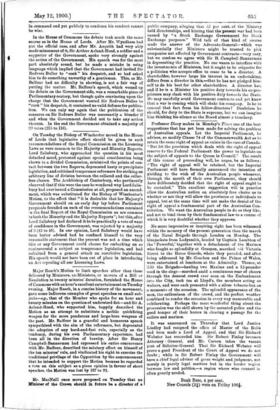Mr. MacNeill once more proposed on Tuesday that no Minister
of the Crown should in future be a director of a
public company, alleging that 32 per cent. of the Ministry held directorships, and hinting that the present war had been caused by " a Stock Exchange Government for Stock Exchange purposes." Wild talk of that kind of course made the answer of the Advocate.General—which was substantially that Ministers might be trusted to pick companies not affected by Government contracts—very easy, but we confess we agree with Sir H. Campbell-Bannerman in deprecating the practice. No one wants to interfere with the investments of Ministers, but it ought to be etiquette for a politician who accepts office to cease to be a director. A shareholder, however large his interest in an undertaking, differs from a director in this,—that he has not pledged him- self to do his best for other shareholders. A director has, and if he is a Minister his positive duty towards his co-pro- prietors may clash with his positive duty towards the State. He may carefully avoid Government contracts and yet know that a war is coming which will shake his company. Is he to conceal that fact from his fellow-directors ? Doubtless be should, for duty to the State is supreme, but we can imagine him thinking his silence at the Board almost a treachery.






































 Previous page
Previous page